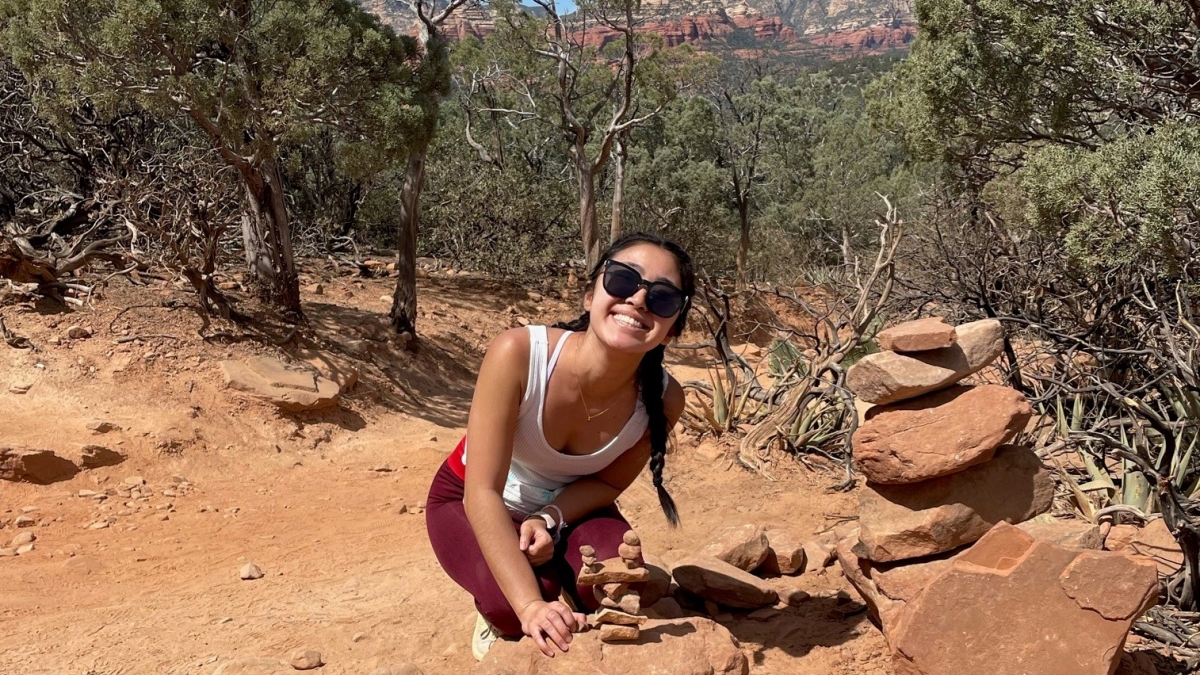College of Health Solutions graduate looks to ‘fill those gaps' in the nutritional picture

Sarah Uehara is graduating with a master’s of science degree in nutritional science. She is being honored as the College of Health Solutions’ Outstanding Graduate Student.
Editor's note: This story is part of a series of profiles of notable spring 2023 graduates.
College of Health Solutions graduate Sarah Uehara has learned the value of taking a holistic approach to health in her time at Arizona State University.
Uehara, from Kaneohe, Hawaii, is graduating with a Master of Science in nutritional science. She is being honored as the college’s Outstanding Graduate Student.
She said it’s important to see the full picture when looking at health issues.
“Seemingly non-health-related factors such as location can play a major role in food choices, for example, which can in turn lead to health outcomes,” Uehara said. “I would say that my perspective has broadened rather than changed.”
Uehara said her interest in nutrition started before she chose to attend ASU.
“I always enjoyed learning about textbook nutrition topics, but learning about health disparities and seeing that gap in health care, food access, etc., really made me want to become a dietitian to help fill those gaps,” she said.
Question: Why did you choose ASU?
Answer: I chose ASU to complete my master's as well as my dietetic internship, but I was drawn to the research emphasis of this program. Being able to contribute to the growth in the field of nutrition, even in a small way, was something I really wanted to be a part of.
Q: Which professor taught you the most important lesson while at ASU?
A: Dr. Punam Ohri-Vachaspati has been an incredible mentor throughout my time at ASU. She has pushed me to put out my best work and gain confidence in myself, but she has also helped me to expand my way of thinking when it comes to health solutions and addressing nutrition issues whether it be at the greater policy level or at the individual patient care level.
Q: What’s the best piece of advice you’d give to those still in school?
A: Make the most of every opportunity you're given even if you don't think it's relevant to you. It's too early to count anything out.
Q: What are your plans after graduation?
A: Currently, I'm planning on moving to Oregon right after graduation. I'll be taking my RD exam in the next few months, so hopefully I'll be a registered dietitian looking for a clinical job in a hospital very soon!
Q: If someone gave you $40 million to solve one problem on our planet, what would you tackle?
A: I'd like to work on making fresh food accessible to people. Bringing fresh food options to rural communities is just a start, but I think it's a good first step in working towards creating healthier communities!
More Health and medicine

Making medicine side-effect free
Many drugs that address medical conditions can come with serious side effects. In drug commercials, the litany of potential side…

Diagnostic research happening at ASU focused on detecting diseases earlier to save lives
It was one of America’s founding fathers, Benjamin Franklin, who may have foreshadowed today’s health care innovation when he…

Fighting the fungus among us
It starts with a spore.When inhaled, spores of the coccidioides fungus can cause coccidioidomycosis — better known as valley…

